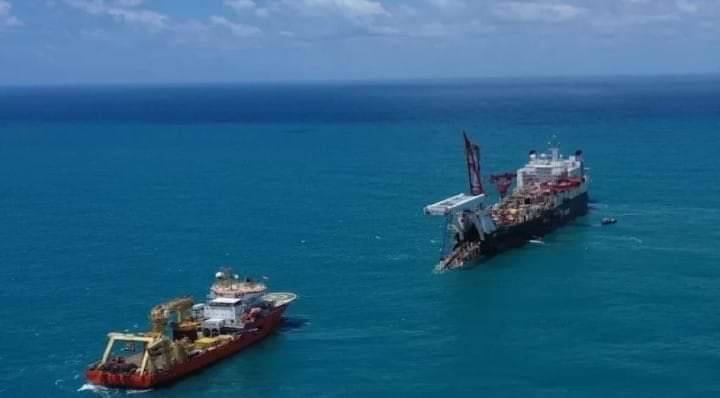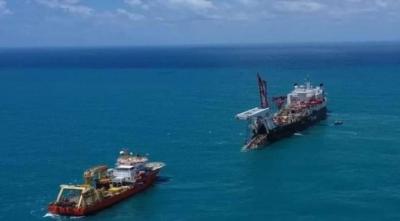"Hezbollah" has dashed hopes for the revival of life in Lebanon with the arrival of summer, which is typically marked by the return of expatriates, imposing its military agenda aligned with loyalties that surpass the boundaries of the Lebanese state. This occurs while efforts to delineate Lebanon's southern borders and ensure its resources falter, as it places its military capabilities in the service of Iran's leadership following the stalled indirect negotiations with Washington in Qatar, alongside the hopes pinned on returning to Vienna and reviving the Iranian nuclear deal.
Although Israel's repeated violations of Lebanese airspace are countless, Hezbollah's drones surpass targeting platforms of oil and gas exploration companies in the contested Karish field with Lebanon. This escalation coincides with growing discussions about an "Arab NATO" aimed at mitigating military threats from Iran following its similar attacks on Aramco in Saudi Arabia and the targeting of Dubai and Abu Dhabi airports, as well as several critical UAE sites and facilities.
The use of drones dates back to 2004 when Iran provided them to Hezbollah for reconnaissance purposes, later developing them during the July 2006 war and subsequently enhancing their threat capabilities, including equipping them with explosives to enable precise strikes on targets since 2018.
Ironically, the very drones that the Houthis use to target oil facilities in the Gulf align with Hezbollah's reconnaissance drones aimed at oil and gas exploration companies along the Lebanese-Israeli border near the Karish "oil" field, amid rising global concerns about the future of oil and gas given the threats posed by the Ukrainian-Russian war on gas supplies to Europe and the world.
Israel introduced drones as a direct threat to Lebanese sovereignty in 2019, targeting the Hezbollah media center in southern Beirut on August 25, 2019. Hezbollah, which employs a strategy of ambiguity in its military and reconnaissance operations against Israel, has recorded several incursions by its drones into occupied Palestinian territory since 2020, some of which were announced while others were intercepted and shot down by the Israeli military, which held the Lebanese government responsible. This occurred when the Israeli military announced the downing of a Hezbollah drone coming from Lebanon, having breached Israeli airspace on March 26, 2020. A similar incident was reported on April 27, 2021, when the Israeli military announced the interception of another Hezbollah drone, discovering another drone "shot down at the Lebanese border" earlier.
Less than a week after Hezbollah fired 19 rockets at open territory in the Golan Heights, the Israeli military reported downing a drone near the Blue Line on August 11, 2021. With the onset of this year and Iran's escalation with the international community, threats from drones have increased on multiple fronts, most recently with Hezbollah confirming the dispatch of three drones towards the resource-rich Karish field in the contested maritime area on the evening of July 2, 2022, following tensions caused by Israel's deployment of a drilling ship to conduct reconnaissance in Karish.
Earlier this year, the Israeli military recorded the downing of a Hezbollah drone that crossed the border in the Al-Malikiyah area on May 17, 2022, along with announcing the interception of two drones, one from Gaza and the other from Lebanon on February 17, 2022, with Hezbollah later claiming the launch of a reconnaissance drone named "Hassan" that flew 70 km deep for 40 minutes after the Israeli military admitted failure in intercepting it.
At the beginning of this year, despite Israel acknowledging the loss of many of its drones in recent years and Hezbollah's successful downing of several along the Lebanese border, an Israeli military report stated the downing of a Hezbollah drone on January 4, 2022, even amidst a noted decline in Hezbollah drone incursions during 2021. According to the report, Hezbollah drones executed 74 sorties across the Israeli border in 2021 compared to 94 the previous year, alongside launching 31 rockets and shells from Lebanon towards Israel in 2021, which were met with about 15 rockets from Israeli fighter planes and roughly 200 artillery shells.
Despite Israeli air surveillance units detecting Hezbollah's incursions through its drones, Israeli security agencies remain concerned about the possibility of a "drone attack from Iran" on Israeli targets, amidst estimates that "Iranian attempts to launch attacks using drones against Israeli targets will continue."




